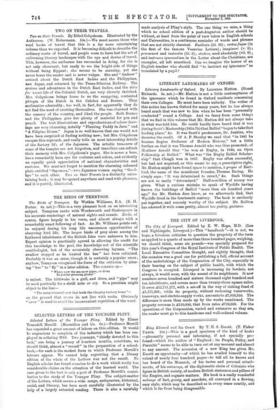SELECTED LETTERS OF THE YOUNGER PLINY.
Selected Letters of the Younger Pliny. Edited by Elmer Truesdell Merrill. (Macmillan and Co. 6s.)—Professor Merrill has expended a great amount of labour on this edition. It would be ungracious to complain of the industry which has been em- ployed in collating MSS. Two journeys, "chiefly devoted to this task," one being a journey of fourteen months, constitute, we should think, almost a "record" in the preparation of a school- book,—for such is the modest form in which Professor Merrill's labours appear. We cannot help regretting that a library edition of the whole of the Letters was not the result. No English scholar has found occasion to do a work which really has considerable claims on the attention of the learned world. The care given to the text is only a part of Professor Merrill's contri- bution to the study of the Younger Pliny. The subject-matter of the Letters, which covers a wide range, antiquarian, historical, social, and literary, has been most carefully illustrated by the help of a largely extended reading. There is also a carefully made analysis of Pliny's style. The one thing we miss, a thing which no school edition of a post-Augustan author should be without, at least from the point of view taken in English schools and Universities, is a continuous reminder of words and phrases that are not strictly classical. Focillata 16) ; certus fugue (in the first of the famous Vesuvius Letters) ; imaginari (v.. 5) ; procuraret and instantia 5) ; studere, used absolutely (vii. 9) ; and instruere ignorantiam in the Letter about the Christians, are examples, all left unnoticed. Can we imagine the horror of an English teacher who should find "to instruct my ignorance" so translated by a pupil?






























































 Previous page
Previous page